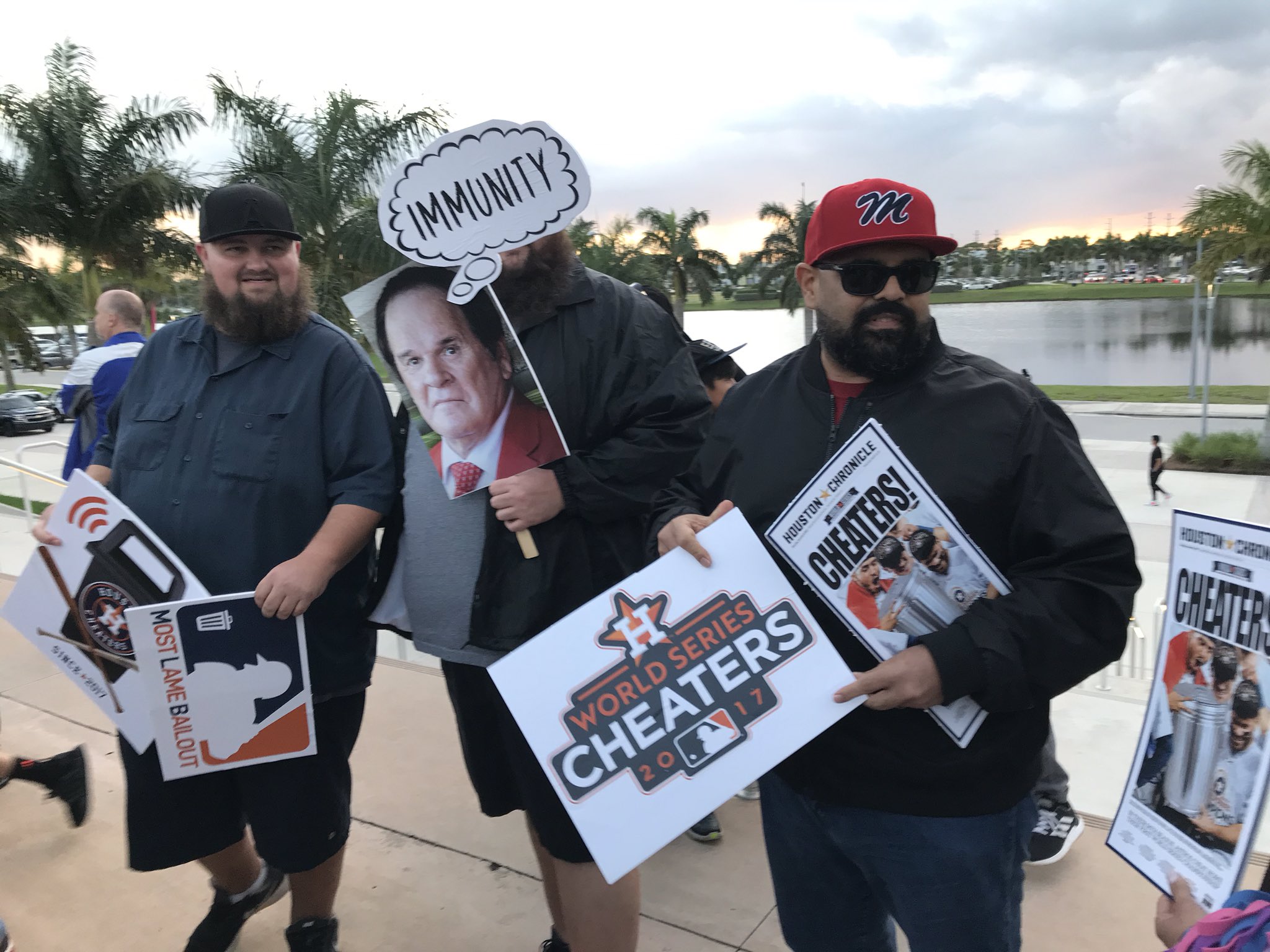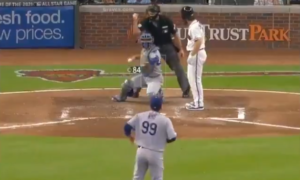MLB’s Sign Stealing Scandal: A Fan’s Perspective

In following the sign stealing scandal gripping Major League Baseball with no signs of letting up, it’s been intriguing to witness the variety of reactions from current and former players and managers.
Some are sympathetic to the Houston Astros organization and its players. Some regard Mike Fiers, former Astros pitcher and whistleblower, as a hero. Others, like Red Sox slugger David Ortiz, see him as a snitch. Some, like Justin Turner, have expressed their indignation with MLB commissioner Rob Manfred for downplaying the controversy and minimizing the World Series Championship itself. Others seem to want simply to turn the page and get back to baseball as usual.
In reading a recent piece by ESPN’s Alden Gonzalez on players’ outspokenness on this issue, I was struck by Clayton Kershaw’s comments on the scandal. From the article and as attributed to the Dodgers southpaw:
You see guys who maybe got kicked out of the league because they got beat by Houston in 2017, you got guys who maybe should’ve won an MVP, or whatever it may be, or stats that are changed. It’s just a bad feeling because you feel kind of helpless about it. I think guys don’t really know how to feel just because it’s never really happened before, so you’re seeing a lot of different responses from a lot of different people.
“You feel kind of helpless about it.”
This comes from a current player directly involved with the outcomes of games. For those of us who watch the action from afar and pin our hopes on make-or-break moments over the course of a 162-plus-game season, there’s that feeling and then some.
One of the things I love about baseball is how many ways there are to appreciate the game. As a lover of sport, there’s the awe of seeing what a select few athletes can do with their skill and ability. If you’re into statistics, there are umpteen numbers to crunch in service of assessing player value and predicting future performance. There’s also the business aspect with all its wheeling and dealing that gives us so much to consider and follow. Plus, should you make it to a live game, baseball is just, well, fun.
All of this is dependent, however, on the belief that what you’re watching is—pardon the political associations—is fair and balanced. Otherwise, we’re veering into professional wrestling territory. At that point, you might as well play up the spectacle. Have outlandish costumes and over-the-top entrances. Let players hit each other over the head with folding chairs. If the product isn’t genuine, really go for the gusto.
Instead, what we have is effective baseball purgatory. We’ve moved past the steroids era, but players are still testing positive for banned substances. Home runs are flying out of ballparks, a phenomenon attributed to “juiced” baseballs which Major League Baseball still can’t (or won’t) explain. Now, with evidence the Astros cheated en route to a championship and the possibility that other teams have engaged in sign stealing, it’s that much harder to feel like what you’re getting is a pure product.
As a fan, this, in a word, sucks.
The Houston Astros went from cellar dwellers to league champions, looking like a model franchise. Jose Altuve, the heart and soul of the team, was a symbol of perseverance in the face of doubts about his height. What’s more, the Astros were not the Yankees. All seemed right with the baseball world.
Now, however? Houston, on the heels of this controversy and reports of a toxic work environment, are Major League Baseball’s version of the New England Patriots. Altuve, one of the faces of the sport, got booed to start spring training. Perhaps worst of all, the Yankees and Dodgers are sympathetic players in this saga. This doesn’t feel like how it was supposed to go.
The negativity surrounding the fallout from the sign stealing scandal is, furthermore, exacerbated by certain attempts to downplay or defend what happened. The league fined the Astros $5 million, took their first- and second-round draft picks in 2020 and 2021, and suspended manager AJ Hinch and general manager Jeff Luhnow for a year before their eventual firing.
Do these punishments amount to serious consequences for the organization? Why didn’t Major League Baseball vacate their 2017 World Series win? What about the players? Why should they be spared MLB’s wrath and not face suspensions or lifetime bans? These are viable questions, and even if the penalties Houston faces are at this point significant or unprecedented, there’s no guarantee the principal actors will encounter serious repercussions beyond one-year bans or temporary unemployment.
Otherwise, some baseball writers insist this scandal is good for the game. All press is good press, right? At least people are talking about baseball—during the offseason, no less. OK, but in what sense? True, the casual observer or sports fan might have their interest piqued by the details.
I, for one, meanwhile, don’t need something like a sign-stealing scandal to produce villains and heroes to generate interest. I have my Mets, their propensity for injury, and their terrible ownership. I have their division rivals to root against. When they almost inevitably falter, I’ll still have fantasy baseball with which to stay engaged. While I want the game of baseball to grow and evolve, I don’t want it to do so at the expense of its reputation.
Such is the reason I feel Major League Baseball is at a precarious point in its history. The NFL still faces deserved scrutiny for its handling of social issues vis-à-vis Colin Kaepernick and traumatic brain injuries suffered by players in an often-brutal sport. The NHL, when not trying to assert its relevance in the North American sports landscape, is plagued by doubts about its commitment to diversity. Baseball is already derided by some as too slow and too bothered with adherence to tradition. It’s doubtful that evocation of the “clubhouse code” and overt allegations of cheating will make more people want to tune in for much of a televised game.
So, as fans, what are we to do? How do we, with a nod to Mr. Kershaw, feel not so helpless about matters? The recourse is obvious, although not with its own added inconveniences. For starters, we can voice our displeasure loudly with baseball’s leadership and those with the most sway. Booing the likes of Jose Altuve may make some of us feel good, at least for a time. An arguably better tack, though, is to render our verdict in the court of public opinion so that the commissioner as well as Astros’ brass and ownership hear our dissatisfaction with insufficient penalties and tepid apologies. Hierarchically speaking, they are the powers that be.
Better yet, we can refuse to watch and go to games. Ay, therein lies the rub. Acting with our wallets is the most direct way of protesting. It also means saying no to a game—America’s pastime, at that—many of us love. Sports are a way of life for my family and me. Baseball makes my life feel that much less soul-crushing. Granted, on the scale of life’s problems, it pales in comparison to most, but it’s a sacrifice, nonetheless.
It’s my sincere hope that people currently and formerly involved with baseball continue to make their voices heard on the seriousness of the sign stealing scandal. Despite our relative remoteness to the commissioner’s office, however, it’s important to remember we can have influence with our words and actions. As with any business dependent on public support to survive, Major League Baseball is responsive to criticism and trends in ticket sales/viewership. If we’re not happy with the product, it’s up to us to do something about it.




















